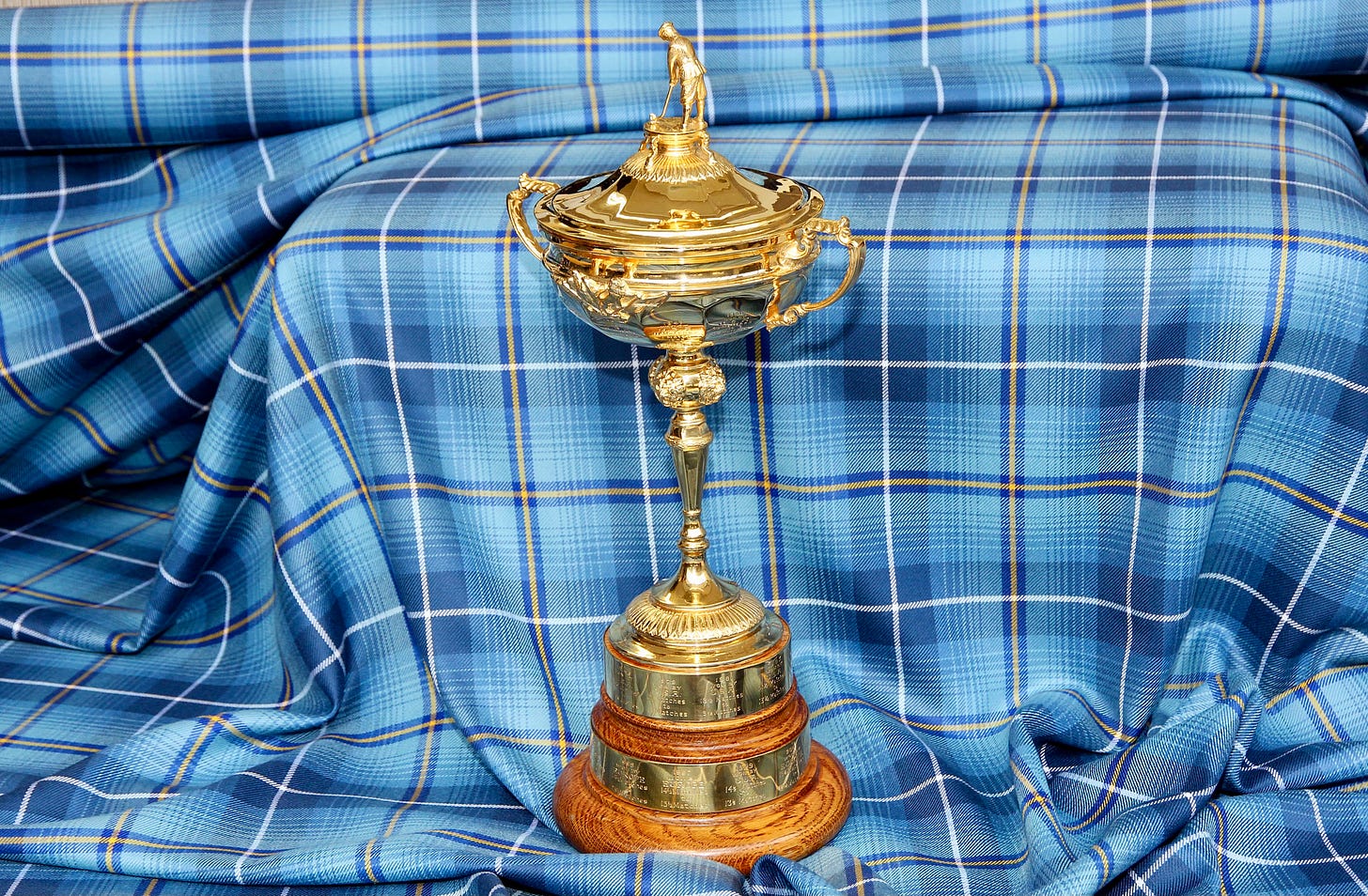Ryder Wrong, &c.
On golf, conservatism, marriage, and more
Over the weekend, the Ryder Cup was played at the Bethpage course on Long Island. This is the biennial competition between the best American golfers and the best European golfers. On Sunday, the last day of the competition, a friend of mine was saying, “You know, some of my favorite players are on the European team.” (My friend is an American, I should note.) “Plus, our fans at Bethpage are acting like such jerks.”
Yes, they were. I will return to that point shortly. But I would like to address the first point first. This will entail some walking down Memory Lane, if you don’t mind.
In October 1995, I wrote a little article for The Weekly Standard on the subject of the Ryder Cup and nationalism. The magazine had just started up; I was an associate editor. My piece is here, but I believe it is behind a paywall. Let me do a little pasting, a little excerpting:
In the weeks preceding the Cup, it occurred to me that I was supposed to support the American team. Not only am I an American, I am (yikes!) a registered Republican.
Those were the days! Anyway, continuing:
The problem was that most of my favorite players, in all the world, were on the European side. Worse, many of my least favorite players were on the American side. It hardly seemed natural to be all rah-rah for the homeboys.
I believe that William F. Buckley, Jr., once wrote, “I am as patriotic as anyone from sea to shining sea, but there isn’t a molecule of nationalism in me.” I have always felt this way about nationalism, even as a child. (Was I expected to go for some American girl over the winsome Olga Korbut? Not a chance.)
“Nationalism” has an air of chauvinism about it, a thoughtless veneration of “my country, right or wrong”; “patriotism,” contrariwise, connotes an enlightened love of country, a rightful appreciation for it. Burke famously said of patriotism that a country, to be loved, ought to be lovely (and a Ryder Cup squad, to be loved, ought to be lovely as well).
But ...
As the Cup approached its climax, and the U.S. had its back to the wall, something strange occurred. I found myself, against all my protestation and ratiocination, aching, dying, for an American victory. And when the Americans were beaten, I felt aggrieved. I cursed the U.S. team, and felt not the least satisfaction for the jubilant Europeans, my personal favorites among them.
Oh, yes.
This past weekend, I was indifferent to the Ryder Cup. I was indifferent to it on Friday, Saturday, and part of Sunday. The Europeans were killing us. Ho-hum, I didn’t care. But on Sunday, the Americans started to come back, big-time. We were comin’ back, comin’ back. And I was dying for them to win—for us to win.
The nationalistic, or tribalistic, juices stirred. (We came up short, by the way.)
My piece in the Standard was titled “My Country, Ryder Wrong.” A perfect title, right? It was bestowed by one of our managing editors, Richard Starr. After the piece was published, Midge Decter told her son, John Podhoretz, a top editor at the magazine, that she had liked it. That she had found it unusual and absorbing.
That tickled me (as we say in the Midwest), because Midge Decter was a writer I admired a lot. (She was from the Midwest too: Minnesota.)
Above, I was talking about the behavior of the fans at Bethpage: obnoxious. Incredibly obnoxious. I so appreciated what Tom Watson said. He is the great player from Kansas City who won five British Opens, one U.S. Open, and two Masters tournaments.
Well said, Tom, and thank you.
A while back, Cedarville University, in Ohio, hosted a series of speeches that addressed the question, “What is conservatism?” I was privileged to be part of that series. Let me parachute into my speech:
I would now like to tell you a story—having to do with conservatism, but not with political conservatism. There is such a thing as a conservative temperament or a conservative bias. This has nothing to do with what kind of tax code you favor or what kind of immigration policy you favor. Let me explain. Bear with me—this is a little weird.
A few years ago, I was in Peoria, and I was taking a walk downtown. In the distance—about four blocks away—I saw a beautiful church, with a beautiful steeple. I went to investigate. I wanted to see what kind of church it was.
It was, the sign said, a “microbrewery and eatery.” And I thought, as I always do: “I would rather churches were burned to the ground than converted to secular purposes.”
We could discuss that—it is a separate speech.
Anyway, I went back to my hotel room, where the Ryder Cup was on. The Cup, as you know, is the biennial golf match between Americans and Europeans. That year, the Cup was being played in Wisconsin.
The gallery was really rowdy. And terribly rude. They cheered the other side’s errant drives. And they cheered the other side’s missed putts.
“So what?” you say. “That’s sports.” Maybe, but that’s not golf, at least traditionally: Golf has always been a game of honor, a game of integrity—a gentleman’s sport.
And I thought the crowd’s behavior was absolutely disgusting.
Now, my feelings—about the churches and golf—are deeply, deeply conservative. Yet, as I reflected that day in Peoria, I would not be considered a conservative by many, many people on the right: people who equate conservatism with, say, right-wing populism.
Don’t get me started on golf, or politics, or ...
***
Or music? For The Dispatch, on Saturday, I had a piece about Grigory Sokolov, the Soviet-born pianist: “A Peculiar Greatness.” Give this a whirl, if you have the time or the inclination. Sokolov is a wonder.
***
In Milwaukee on Saturday, I met a woman who has been married a long time. “I met my husband before he was born,” she said. I thought she was making a metaphysical, a spiritual, point. No, not really.
“I was three days old, and my mother introduced me to his mother, who would give birth to him two days later.”
So, they grew up together? Were childhood sweethearts and all that? No. They met, or re-met, 19 years later, on a blind date.
Did they hit it off, immediately? Oh, did they. The way my friend put it was: “It was bing.”
***
Let’s have a language note. In a column a couple of weeks ago, I said that people were saying “more so” when they meant to say “more.” This has grown up in America like a weed.
A friend writes,
I had never thought about the “more so” problem until I read your column a few hours ago. Now I am sitting in a meeting and one of the first things the guy in charge says? “Now more so than ever”!
See? A weed.
***
I’m in the subway. A mother is trying to placate her impatient child. “The train’s coming in four minutes,” she says. “If you sing one song, it will be here.”
That’s kind of a long song, isn’t it? But a brilliant parental technique.
Take care, my friends. Good to see you. Beware the loutification of golf, and of life in general! Later.





Nationalism: To say ‘‘my country, right or wrong, is like saying, my mother, drunk or sober.’’ GK Chesterton .
I think you hit something that I have been thinking for a while about conservative temperament. I was raised social democrat and still will usually pull the D lever, but as I explore political conservatism more, I realize that at least the non populist kind speaks to my temperament, and some of those definitions of that generic conservatism are respect for being cautious, polite, understated, deferential, trusting in institutions, humble, and preferring incremental change over revolution.
I was so pleased to see that you are writing for the Dispatch. It's such an excellent place for homeless conservatives to hang their hats. And Kevin Williamson is there!
Hope to see more from you there in the future.
P.S. Did you watch the Euros' putting streak at the Ryder Cup match? Wowza!